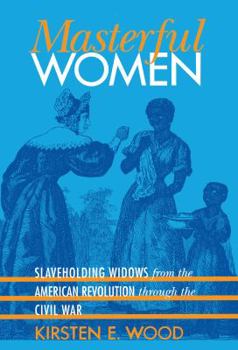Masterful Women: Slaveholding Widows from the American Revolution Through the Civil War
Select Format
Select Condition 
Book Overview
Many early-nineteenth-century slaveholders considered themselves "masters" not only over slaves, but also over the institutions of marriage and family. According to many historians, the privilege of mastery was reserved for white males. But as many as one in ten slaveholders--sometimes more--was a widow, and as Kirsten E. Wood demonstrates, slaveholding widows between the American Revolution and the Civil War developed their own version of mastery.
Because...
Format:Paperback
Language:English
ISBN:0807855286
ISBN13:9780807855287
Release Date:June 2004
Publisher:University of North Carolina Press
Length:304 Pages
Weight:0.90 lbs.
Dimensions:0.7" x 5.7" x 9.3"
Customer Reviews
0 rating





